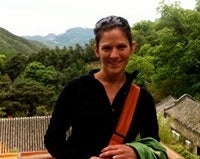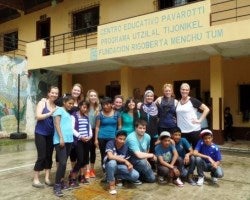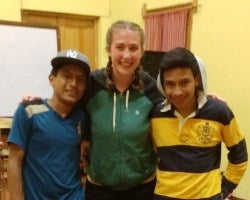
Brunner at the Tangzhe Temple in Beijing.
When learning takes place outside a traditional classroom, the opportunities for students to gain real-world experiences abound—but when learning takes place outside a student's home country and culture, the possibilities for development and learning grow exponentially. Each Maymester, the Communication Department takes an average of thirty students abroad to study in China and Guatemala. These two study-abroad programs have grown to exemplify what it means to learn experientially, combining service and storytelling in ways that offer students not only credit hours, but also the kind of experiences that can shape the rest of their lives.
Narratives of the New China: Engagement & Exploration
CU President's Teaching Scholar Lisa Keränen is Associate Professor and Director of Graduate Studies in the Department of Communication, and has been taking students to China as part of the Narratives of the New China class on and off since 2010. Elizabeth (Betsy) Brunner (MA Communication, 2011) is now a PhD Candidate at the University of Utah whose research focuses on the use of images in environmental protests in China. But as a CU Denver student with interests focused mainly on gender, Brunner remembers, "I was in the process of finishing up my MA before heading on to a PhD program in Utah when Lisa began promoting the trip. I never thought I would ever go to China." Brunner says Keränen presented the program as a potentially life-changing experience, but that she had no idea how true this seemingly hyperbolic statement would be until she arrived in Beijing: "Experiencing China made me think anew—in ways I never could have had I not gone. China offered me the opportunity to experience a world different from my own, which opened up new possibilities of being, engaging, thinking, and interacting with people and ideas. Moreover, China served as a mirror through which I could see my own culture differently."

Lindholm at the Great Wall.
Before going there, Brunner recalls thinking of China as a rather dull place—a place defined mostly by political clashes with the US. Her travels in China exploded her preconceptions and introduced Brunner to a country that she describes now as highly complex, colorful, cacophonous, and in the midst of exciting change. As a result of her experiences in China, Brunner shifted from studying gender and media to studying China, the environment, and social media, and she has returned to China every summer since Narratives. She says, "It is no exaggeration to say that my view of the world has changed dramatically as a result of traveling to China. I now see why China–US relations are of the utmost importance and why the US and China must work together, especially when it comes to issues of the environment. If one thing has become clear via my studies, it's that pollution knows no political borders, and a more sustainable future requires a great deal of collaboration, persistence, and creative solutions—especially between the US and China."
Lisa Keränen sees transformations like the one experienced by Brunner happen every time she and her colleague Associate Professor Hamilton Bean, who also often teaches the class, lead a group of students to China. She says, "Students often say at the farewell banquet that the learning experience was among the richest of their time at CU Denver, but the real proof is when they write me years later saying the same thing. What's amazing is how everyone, both Denver-based and Beijing-based students alike, all begin to see their own cultures differently through conversation and storytelling with the other. It ignites an interest in US-China relations and how the world's two most powerful economies are engaging one another."
Kristen Lindholm (MA Communication, 2012), another former Narratives student, is now an Instructor at the International College Beijing (ICB). ICB was founded in 1995 as a joint venture educational program between China Agricultural University and the University of Colorado Denver, and remains one of the longest running bilateral educational programs authorized by the Chinese government. Lindholm teaches public speaking, fundamentals of communication, business and professional communication, communication and diversity, and introduction to media studies. She says, "A big part of my job at ICB includes preparing students for Denver and a new structure and system of education. We talk a lot about communication across cultures and learn together as we compare life experiences, assumptions, and values." While she encourages Chinese students to come to Denver, she also can't stress enough how much she feels US students can gain from the experience of studying in China, and says, "Go to China, you won't regret it! Be flexible, go with an open mind, and you will be transformed!" She does have one word of warning: "Just know that you may end up staying longer than you ever imagined. I never expected to be teaching in China and now I wouldn't change my experience for anything."
Lindholm and Brunner agree that the most rewarding part of the Beijing experience for them involved connecting with Chinese students and getting to understand China through their perspectives and experiences. Brunner remembers four Chinese students in particular who answered an unending stream of questions, took her to Chinese restaurants and shops, and helped her to "process" China. Brunner says, "Without them, this witnessing of a new world would have lacked the depth that their explanations offered. Without them, I would not have asked as many questions nor seen as much of China. Talking with people from another culture about their culture while living in their culture made my experience of China far more profound." Lindholm expands on similar sentiments, saying, "The best part of the experience was becoming friends with ICB students from Beijing. The friends I met from Beijing showed me the best places to buy street food, and provided context for the readings I was doing for the course. The friends I made on my travel-study trip are still friends that I stay in contact with."
Keränen and Bean will be teaching Narratives of the New China jointly this coming May. Since last year, Keränen has added a digital storytelling component, so that in addition to using theories of narrative and public memory to understand China's rise, students are learning to create their own digital productions about China's national narratives. China Rising is a video that she and the documentary filmmaker Jeremy Make put together based on their experiences last May.
Nobel Cause: Peace and Justice in Guatemala
Similarly, students traveling to Guatemala each year with e.j. Yoder, Senior Instructor and Undergraduate Advisor, don't have the type of study abroad experience that skims the surface and leaves them "study tourists." The Department of Communication and the PeaceJam Foundation joined forces in 2009 to offer CU Denver students the opportunity to participate in a service-learning focused course in Guatemala, working with Nobel Peace Prize Laureate Rigoberta Menchú Tum's Foundation in both Guatemala City and San Lucas Tolimán. Through this program, CU Denver students make a real impact on Guatemalan communities, while the experiences they have forever alter their own lives.

Students at the Pavarotti Education Center.
At its inception, the course focused on Guatemala's genocidal thirty-six-year civil war, which engulfed the country from 1960–1996, and during which an estimated 200,000 indigenous people were disappeared, tortured, and murdered. Upon arrival in Guatemala, students still spend an afternoon at La Fundación de Antropología Forense de Guatemala (FAFG), with the forensic anthropologists who are exhuming the mass graves around Guatemala City. But now, after a few days, the class moves to San Lucas Tolimán, a small village on Lago Atítlan and home to the Kaqchikel indigenous group. Students' service learning happens as they integrate into the community, says Yoder, "We live at the foundation's Pavarotti Education Center and we do whatever they need from us. Some students help out in the computer lab, some teach English, some help Carmen in the kitchen. We all build furniture, desks, picnic tables... we do whatever is necessary to help the center run better." The Pavarotti Education Center serves about 180 local children through middle school and high school, with a focus on basic education and indigenous cultural education.
Caroline Callea, a Pre-Education major, started college at Colorado State University but transferred to CU Denver in part because she saw the study abroad opportunities offered as more accessible and applicable to her educational goals. She describes the decision as one of the best she ever made, and says of going to Guatemala, "Something about doing a service project really stood out to me. I have always wanted to do one; paying it forward and giving back are always things I am trying to do." Callea had already signed up for another travel-study course to Mexico, but when it fell through she met e.j. in person and the enthusiasm Yoder demonstrated for the Guatemala course was so infectious that Callea never looked back. "I read that we got to work with children, and the pictures I saw of my peers with the students made me realize that was what I had to do."

Callea with Guatemalan students in the classroom.
Among students who have traveled with Yoder to Guatemala one opinion dominates: agreement that the experience has changed them forever and in invaluable ways. Robert Judson, a senior International Studies major, had never traveled outside the US until he left for Guatemala this May, and says, "For a student, anybody really, to travel and study abroad, the real thing you come back with is a larger, more expanded and rounded world view, and that is such an invaluable asset for anybody in the globalized world of today." Judson says that before travelling to Guatemala he thought he understood poverty, having seen his fair share of projects and barrios throughout the United States, but "I now realize that I know very little about poverty in the world. What I have long considered poverty, when compared to the poverty present in a place like Guatemala City, does not appear as impoverished."
However, Judson's experiences overall were far from negative. He says books he read as a child and National Geographic magazines had fueled romanticized notions of Central America before the trip, but that the realities of the place were far more than he could have ever imagined. "I do not think that a moment went by in which something new was not presenting itself to my senses. All color seemed so incredibly rich and vibrant, the food savory and the countryside itself endless stunning expanses of mist-covered volcanic mountain rain forest. There was so much to take in," he remembers. Getting specific, Judson recalls, "One of my favorite experiences was a boat taxi ride across Lake Atítlan so the class could explore the lake towns of San Pedro La Laguna and Santiago Atítlan. The lake was fairly smooth and the sun and clouds reflected in the waters as we travelled across the lake from town to town." Because of experiences like this, Judson declares himself fully convinced that everyone should visit Guatemala at least once in their lifetime.
Alicia Drury would agree. Sometimes the life-changing experiences gained on travel-abroad programs aren't the type that lead students down a new path, but rather the type that confirm the paths students have already chosen. An International Studies major and Women and Gender Studies minor, Drury had many reasons for signing up for the Guatemala course, among them was her programmatic focus on Latin America. She says, "This experience has affirmed my decision to focus my regional studies on Latin America, and it has motivated me to continue my Spanish studies so that I am fluent in this language once I finish my graduate degree." Drury says that during the course of exploring the multiple cities and communities within Guatemala she found certainty, and that, "It has also inspired me to continue any service work that I am able to in Guatemala, as well as to increase awareness of the history, struggles and culture of the peoples."
Caroline Callea was likewise motivated to make an impact on the lives that touched hers while she was in Guatemala, and has put her feelings into action. "Seeing how the education system was run down there, the lack of books, school supplies, resources... just broke my heart," Callea says. "When we got the tour of the school we went into the library and I became so emotional. I knew right then that I wanted to start a fundraiser to raise money to send back to them so Osbaldo, the Director, could buy more books for the students." Callea started a book drive for the Pavarotti Education Center, because she wants to give back. As an aspiring teacher herself, Callea couldn't ignore the need for resources the educators at the school were faced with. The first campaign Callea launched on July 1 of this year raised $500, and Callea just launched a second drive hoping to match that. Anyone interested in contributing any amount to Callea's efforts can visit her fundraising page.
Measuring the impact of an experience on a life can be difficult—but there are indelible marks, easy to see for anyone who looks, on the students who learn in China and Guatemala through the Communication Department's Maymester programs. Anyone interested in learning more about Narratives of the New China: Engagement & Exploration is encouraged to contact Lisa Keränen at lisa.keranen@ucdenver.edu. For more information about Nobel Cause: Peace and Justice in Guatemala, please contact e.j. Yoder at ej.yoder@ucdenver.edu.
